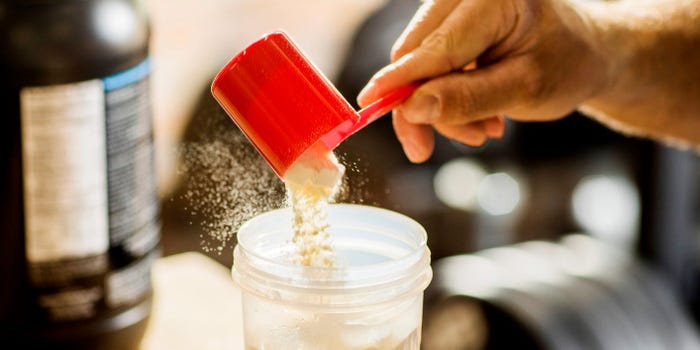If you take your exercise seriously, it’s important to consider your protein intake, especially if you’re lifting weights in the gym. Protein aids the repair and rebuilding of muscles after a workout, so you need to make sure you’re getting enough of it to support your training. While this can be done through your regular diet, protein supplements are an additional way to bolster your protein intake outside your main meals.
Contents
Whey Protein: An Integral Part of the Fitness Journey

One of the most common protein supplements used by gym-goers is whey protein and for a good reason. Whey protein is easily digested and provides essential amino acids required after training to support muscle recovery and synthesis. When compared to casein, whey protein is digested and utilise more quickly while casein stays in the gut for longer.
But what is whey protein, you may ask? Milk contains two main types of protein: casein (80%) and whey (20%). Whey is the liquid part of the milk that separates during cheese production. After the whey is separated during cheese production, it goes through different processing steps to become what is recognised as whey protein – a powder that is added to meal replacement, shakes and protein bars. On its own, whey protein doesn’t taste very good, the reason why it’s usually flavoured. Whey powder products with flavours like chocolate, vanilla and strawberry are especially popular.
Generally speaking, there are three common forms of whey protein: protein concentrate, whey protein isolated and whey protein hydrolysate. Whey concentrate contains some of the sugar and fat from the milk. Whey isolate, on the other hand, has the fat and sugar removed, meaning there is more protein per 100g of the product. Whey hydrolysate is further processed to break down some of the bonds of the protein into amino acids. Theoretically, this type of whey protein is absorbed quicker as no digestion is necessary. However, this doesn’t mean it is suitable for milk allergy sufferers as it’s not hydrolysed enough.
If you are considering adding a whey protein supplement to your diet, here are the benefits you’ll enjoy.
Increased Strength & Power
When you do physical exercise, your body is placed under stress, both physically and metabolically. This causes a series of physiological changes to take place. One of these changes is an increase in the release of stress hormones such as cortisol, which has a catabolic effect on the body. Furthermore, as your body requires energy and fuel to start preparing the muscles, it begins to eat away at your own muscle tissue in a try to repair the very same muscles.
Whey powder protein provides the body with all the nutrients it needs, including proteins and amino acids. This helps placed the body in an anabolic state, in which it beings to build muscle instead of eating it. The bigger and stronger the muscles become, the more power and strength they will be able to generate.
Faster Fat Loss

When it comes to fat loss, many turn to fat-burning products without knowing that whey protein can also help burn body fat whilst preserving and building lean muscle. Protein is thermogenic, which means that our body struggles to digest it and break it down – even in supplement form. This means that your body has to work harder, hence it burns off more calories just by digesting the protein. Whey protein also helps keep you feeling full for longer, so you’re less likely to overeat and consume more calories than necessary.
Lean Muscle Growth

You may think that when you lift weight in the gym you are building muscle, but the opposite may be happening. You may be actually destroying your muscle tissues. Our bodies see physical exercise as stress, and so they try to rebuild the muscles even bigger and stronger than they were previously, in an attempt to help protect them from being damaged again the next time you exercise.
As soon as you consume a shake made with whey protein powder, nutrients are forced into the awaiting muscle cells, and so the recovery process starts right away. Without these proteins and amino acids, however, the body would have no nutrients to start the post-workout recovery process, so your muscles wouldn’t grow larger and repair themselves. Without a protein supplement, your workout can actually do more harm than good to your body.
Is Whey Protein for Everyone?

If you are allergic to gluten, you may be wondering if is whey powder gluten free? While whey protein is naturally gluten-free, some protein powders available on the market may contain added gluten or be cross-contaminated with it. So, you want to make sure you look for whey protein products with a third-party seal of approval to ensure that the product meets strict criteria.
Many people worry if whey powder causes constipation. Well, most of whey protein’s side effects are related to digestion. Some individuals have problems digesting whey protein and experience symptoms such as bloating, gas, stomach cramps, constipation or diarrhoea. However, most of these side effects are related to lactose intolerance. Lactose is the main carb in whey protein, so if you are lactose intolerant, try using a whey protein isolated powder. This form of whey protein is more refined, with a significantly smaller amount of fat and lactose than whey protein concentrate. Individuals with lactose intolerance can often safely take whey protein isolate.











